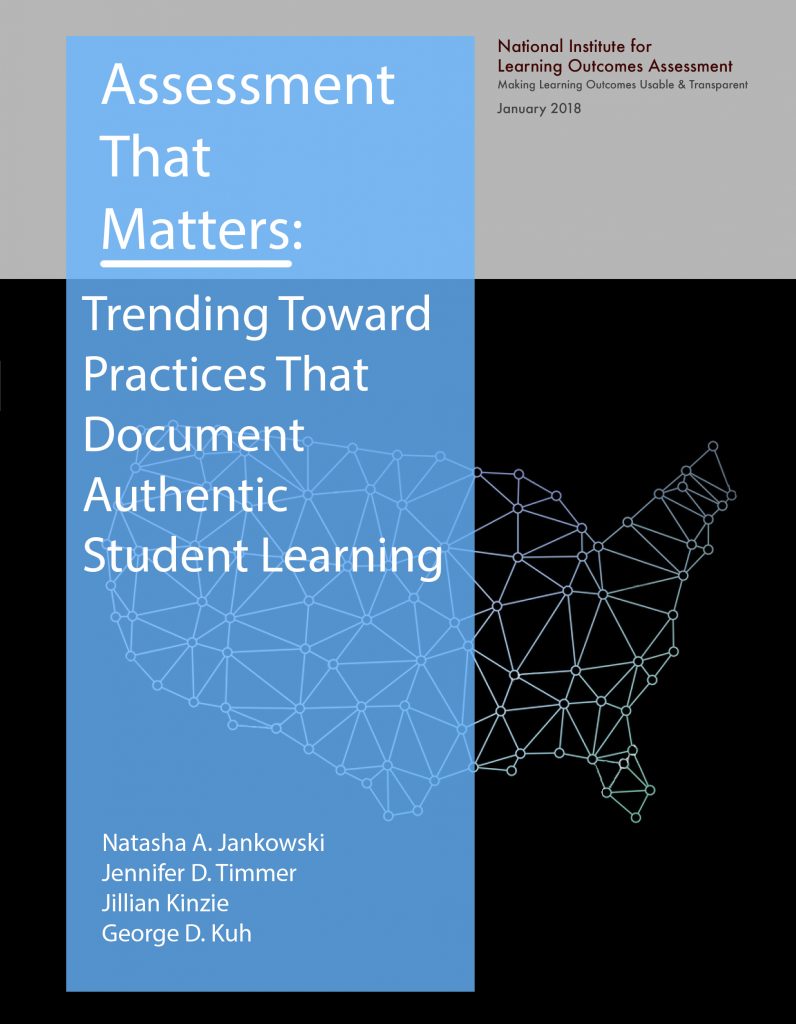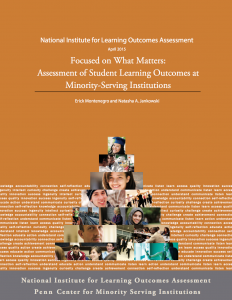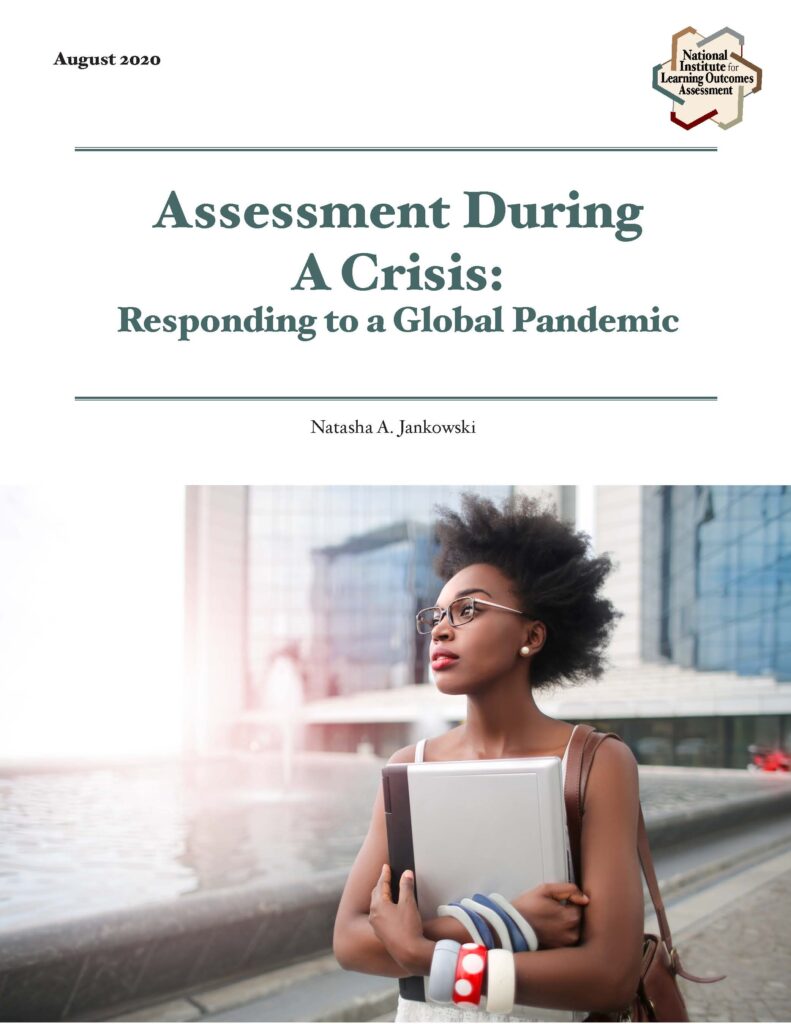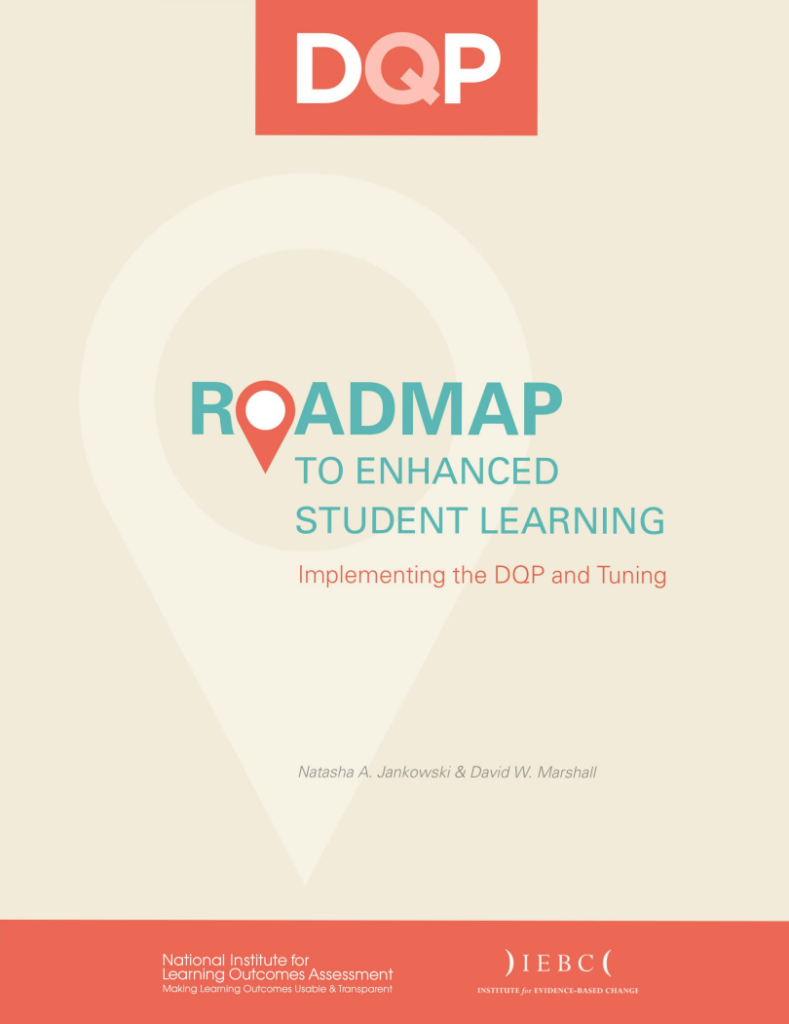Reports
NILOA undertakes research projects to examine student learning outcomes assessment at colleges and universities across the United States. Reports are organized by topic area. Click on a banner to expand the selection, read a report synopsis, view audience icons, and download the reports.
April 2022

In partnership with NILOA, Dr. Natasha Jankowski, former executive director of the National Institute for Learning Outcomes Assessment (NILOA) and Dr. Divya Bheda of ExamSoft Worldwide LLC, explored what could be learned from the various shifts and changes to assessment-related processes and practices undertaken in response to COVID-19 in order to inform the future of assessment. In this report, Drs. Jankowski and Bheda discuss findings from a recent survey of higher education faculty, staff, administrators, and students who shared their perspectives and advice working to ensure student success and equity by improving curricula, assessments, teaching, and learning. NILOA collected resources to assist colleges and universities as they moved to remote learning. This archive of resources can be found here.
Additional materials (webinar recording on survey findings, link to the report, slides, link to Fast Fact one-pagers) are available on the Examsoft website here.





August 2020

At this transformational moment in history, this report takes time to center Historically Black Colleges and Universities (HBCUs) within the assessment realm; from teaching and learning experiences to internal and external mandates, from accreditation requirements to advocacy and agency. The paper argues that this work requires more than a statement of words and phrases including diversity, equity, inclusivity, culturally relevant, etc. It requires the lived experiences of HBCU connoisseurs. Let the lessons presented from our HBCU colleagues be the motivation needed to deliver on the promise of an equitable educational experience, for all students.






August 2020
Assessment During A Crisis: Responding to a Global Pandemic
In March 2020, institutions abruptly pivoted to remote instruction, sending students, faculty, and staff away from college campuses in response to COVID-19. In June 2020, NILOA launched a survey to capture a snapshot of assessment-related changes made during Spring 2020 and to help determine remaining professional development needs. The report provides an overview of findings from 813 responses representing 624 different institutions and organizations, couples those findings with other reports released from March through July, and provides a ‘do’ and a ‘do not’ for higher education and the field of assessment looking beyond Fall 2020.






November 2018
 Assessment, Accountability, and Student Learning Outcomes
Assessment, Accountability, and Student Learning Outcomes
at Historically Black Colleges and Universities
This report presents the background of and need for the Historically Black College and University (HBCU) Collaboration for Excellence in Educational Quality Assurance (CEEQA); the first collaborative of its kind. As both internal and external accountability mandates increase, so too has the need for a strong HBCU alliance. CEEQA seeks to help address accountability measures while being true to HBCU missions and culturally relevant assessment approaches.



October 2018
In this 10th year of NILOA, we pause to look upon our origins where we came from and where we have been, as we look to the future of where we are going. There are still questions of the value and worth of higher education, of the learning that students achieve in their time with us, and how we go about documenting and using evidence of that learning to improve our practices and help all students succeed.





January 2018
 Assessment that Matters: Trending toward Practices that Document Authentic Student Learning
Assessment that Matters: Trending toward Practices that Document Authentic Student Learning
Following up to its 2009 and 2014 surveys of chief academic officers, NILOA continues to provide a landscape of current approaches and practices related to assessing student learning. This report summarizes major findings and presents implications for policy and practice from a survey of 811 regionally accredited, undergraduate degree-granting institutions from throughout the U.S.





April 2015
 Focused on What Matters: Assessment of Student Learning Outcomes at Minority-Serving Institutions
Focused on What Matters: Assessment of Student Learning Outcomes at Minority-Serving Institutions
This report features the assessment work being done at Minority-Serving Institutions (MSIs). Comparisons are made between assessment activities at MSIs and those at Predominantly White Institutions (PWIs) as well as within different types of MSIs such as Tribal Colleges, Historically Black, Hispanic Serving, and others.



October 2015
 Beyond Compliance: Making Assessment Matter
Beyond Compliance: Making Assessment Matter
Through exploration of the relationship between assessment and compliance, the authors attempt to answer the central question of, How can assessment work become consequential so that information about learning outcomes is used to boost student and institutional performance? Examples of evidence of student learning accompany current environmental trends. Additionally, this issue of Change magazine features several articles relevant to student learning assessment.




March 2019
 Assessment for Student Learning and the Public Good
Assessment for Student Learning and the Public Good
Leaders from three organizations Association for the Assessment of Learning in Higher Education, Association of American Colleges & Universities, and the National Institute for Learning Outcomes Assessment discuss their commitment in engaging colleagues in productive and meaningful conversations about assessment. In this article, the authors propose 6 principles of effective assessment as institutions and individuals shift to an assessment-for-learning-improvement mindset.




January 2014
 Knowing What Students Know and Can Do: The Current State of Student Learning Outcomes Assessment in US Colleges and Universities
Knowing What Students Know and Can Do: The Current State of Student Learning Outcomes Assessment in US Colleges and Universities
In a follow-up to the 2009 survey of chief academic officers, NILOA again asked institutions about practices and activities related to assessing student learning. This report showcases findings regarding institutional activities, uses, drivers, and areas of continued need to advance the assessment of student learning. In addition, the report examines changes and shifts over time in institutional assessment related activities. You can also read an abridged version of the report.




June 2011
 Down and In: Assessment Practices at the Program Level
Down and In: Assessment Practices at the Program Level
In 2010, NILOA asked select department or program chairs at every accredited two- and four-year college and university in the U.S. about their assessment practices. The report informs individuals responsible for implementing assessment at the program level as to what assessment practices are being used in their disciplines at other institutions.

October 2009
More than You Think, Less than We Need: Learning Outcomes Assessment in American Higher Education
Contrary to what observers think, findings from a national study released in 2009 of chief academic officers show that gathering information about what undergraduates learn during their studies is commonplace in most US colleges and universities. However, the results are not always used and reported in ways that could improve student accomplishment and inform the public about institutional performance. Most institutions use multiple approaches to measure what happens to students during college, with accreditation being the primary driver of such assessments. You can also read an abridged version of the report.




March 2014
Institutional Assessment Practices Across
Accreditation Regions
This report was prepared for the Council of Regional Accrediting Commissions (C-RAC) based on analysis of national provost survey responses. The report examines similarities and differences in assessment practices across the seven regional accreditation bodies, comparing responses from the 2014 survey with those obtained in 2009, fleshing out changes in institutions assessment practices over time.



June 2018
Helping Students Develop Habits of Reflection: What We Can Learn From the NILOA Assignment Library
NILOA worked with faculty from around the country to build an online library of assignments that both foster and provide evidence of student learning. This report highlights common features between the various assignments, the value and role of reflection, and important developments that can provide synergy for further work on reflective assignments.

November 2018

Fertile Ground: The Movement to Build More Effective Assignments
Intentionally designing and using classroom assignments that align with desired student learning outcomes can better support student success, encourage curricular improvement, and inform pedagogy. NILOA authors Pat Hutchings, Natasha Jankowski, and Gianina Baker provide insights on emerging work on assignment design.


March 2016

Designing Effective Classroom Assignments: Intellectual Work Worth Sharing
NILOA’s Assignment Library initiative is the central focus of this article. Included is a sample assignment from the University of North Dakota, an exploration of what assignments are and aim to do, how good assignments can help us gauge student learning, and how to catalyze assignment design work on campus.


November 2014
NILOA set out in the fall of 2013 to create an online Assignment Library of faculty-designed and peer-reviewed assignments linked to Degree Qualifications Profile (DQP) proficiencies. This report shares what is being learned through the Assignment Library initiative with models institutions can use to foster and support serious work on assignment design.

January 2017
Unpacking Relationships: Instruction and Student Outcomes
This paper explores five areas of intersection between instruction and student outcomes, arguing that what faculty do and how instruction occurs matters, and matters greatly. The intersections include transparency, pedagogical approaches, assessment, self-regulation, and alignment.
May 2016
Higher Education Quality: Why Documenting Learning Matters
The NILOA policy statement outlines the warrant for multiple, systematic approaches to obtain evidence of authentic student achievement and addresses some well-reasoned concerns that poorly designed assessment efforts can distract from, rather than enhance, the quality of teaching and learning. The statement concludes with five principles, that when adapted appropriately to an institution’s educational purposes and programs, can spread and accelerate assessment work worthy of the promises colleges and universities make to their students, policy makers, and the public.


July 2012
Using Assessment Results:
Promising Practices of Institutions that Do It Well
To learn more about what colleges and universities are doing to use assessment data productively to inform and strengthen undergraduate education, NILOA conducted nine case studies. This report synthesizes the insights from these individual studies to discern promising practices in using information about student learning along with lessons learned and reflective questions to guide practice.


October 2010
In October 2010, a NILOA researcher highlighted lessons from four focus group sessions with campus leaders, presidents, provosts, academic deans and directors of institutional research from a variety of two- and four-year institutions regarding their perspectives on the state of learning assessment practices on their campuses.
May 2012
Transparency & Accountability:
An Evaluation of the VSA College Portrait Pilot
NILOA was asked by the VSA to evaluate the effectiveness of the student learning outcomes pilot project within the College Portrait. This report contains findings from the five month evaluation pulling from various data sources, concluding that while a necessary response to demands at the time, the current format of reporting needed to be modified moving forward to address user concerns.
November 2011
Making Student Learning Evidence Transparent:
The State of the Art
In November 2011, NILOA researchers released this report composed of four sections: 1) the impact of national transparency initiatives; 2) the changing landscape of transparency; 3) the display of assessment results and their subsequent use; and 4) a synthesis of the previous three sections.


June 2010
In the Spring and Summer of 2009, NILOA examined the content of institution-wide websites (n=725) to determine the extent to which colleges and universities made information available about student learning outcomes assessment. This analysis, in conjunction with the national survey given in 2009 to chief academic officers, gives us a broader picture of the state of learning outcomes.
December 2017
Tuning Impact Study: Developing Faculty Consensus to Strengthen Student Learning
The Tuning impact study explores the intended outcomes of Tuning as well as the assumptions behind the benefits of engaging in a Tuning process. In this report, outcomes from the work of Tuning in the United States from 2009-2016 are explored. Findings address the process of reaching consensus, faculty cross-institution collaborations, implications for transfer and pathways, educational redesign and assessment, and student and employer engagement.

May 2017
Tuning: A Guide for Creating Discipline-Specific Frameworks to Foster Meaningful Change
Tuning is a faculty-driven process that provides a structured but highly flexible methodology to define the learning deemed essential to a discipline and to identify the benefits of a discipline-specific degree. This report presents observations on the different ways in which states, consortia, and disciplinary associations have used Tuning to develop discipline-specific learning frameworks.
June 2016
To determine the effects of the Degree Qualifications Profile (DQP) use on institutional policies and practices, NILOA conducted a study of the more than 400 (n=425) institutions that used the DQP between the 2011 release and the October 2014 revision, exploring how institutions engaged with the DQP and made associated changes in curriculum, instructional practices, and assessment activities.
June 2016

Using the Degree Qualifications Profile
to Foster Meaningful Change
NILOA has been tracking campus engagement with the Degree Qualifications Profile (DQP), identifying approaches that institutions have used to implement the framework in meaningful ways. In this report, we describe those approaches and how they have been used within and across institutions whereby the DQP served as a catalyst for comprehensive reform with the student at the center initiating changes in curriculum and pedagogy, as well as organization and support structures.
October 2014
Roadmap to Enhanced Student Learning:
Implementing the DQP and Tuning
Rather than a how-to manual, this document explains many of the routes institutions have taken in using the DQP and Tuning to advance student learning. This is of importance as the DQP has been used as a national conversation starter–a tool for institutions to comment upon and use to reflect on the meaning of a degree through a process infused with Tuning principles.

November 2013

The Degree Qualifications Profile: What It Is and Why We Need It Now
to Foster Meaningful Change
The authors document the impact and use of Degree Qualifications Profile (DQP) on college campuses and universities. Information on various pilot projects are presented as well as the value and worth of the DQP.



















